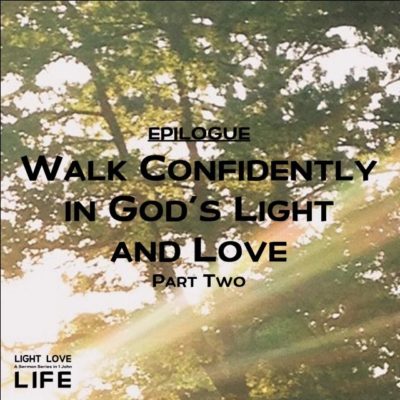Sermons on 1 John
This month, we have focused on the themes of Advent—hope, peace, joy—and today we will be looking at love. It is difficult for us to understand the love that God has for us… the love that He demonstrated through the gift of His Son, but God’s love is a theme we find throughout Scripture. As we’ve considered these themes of Advent, we have focused on the writings of the Prophet Isaiah. These prophecies of the promised Messiah were written over 700 years before their fulfillment. We will look again to the prophet’s writings in a few minutes, but first I want us to focus on the writings of another of the Old Testament books of prophecy—the Book of Lamentations.
In this final, synoptic study of Romans 12, we will reflect on some of the major themes from this chapter over the past ten weeks in an effort to see clearly what the Scripture means when it tells us to not be conformed to this world, but be transformed—be different! Transformation is a process! It starts with a decision to offer our lives to the Lord. Then the Lord works in us—humbling us and teaching us how to serve others within our giftedness. As we serve Him by serving others, it is His desire that our lives display the marks of a true Christian—genuine love for one another, diligent service to the Lord, patience in tribulation, persistence in prayer, and generosity in everything. Exhibiting these characteristics of a true believer is essential in our quest for overcoming the evil that persists in our lives. And we must never forget that the only way to gain victory over evil is with the righteousness of God.
Anger is an emotion that can be used for great harm or great good! In itself, anger is neither positive or negative—neither productive or destructive. It all depends on how somebody uses it. In this study, we will examine the source of anger and what anger is designed to stimulate to bring about a better end. We’ll also take some time to think about the dangerous side of anger and why it can be so destructive.
“No one leaves a legacy by accident. You must live life on purpose and come up with a plan to protect your legacy and make sure the baton is passed to the next generation” (ramseysolutions.com). What changes do you need to make in your life that will help ensure that you will leave the kind of lasting legacy that brings honor to the Lord? I believe that these things were in the mind of the Apostle Paul as he was writing this second letter to the Corinthians. These people were a portion of his legacy—and they would be leaving a legacy to those who would come after them—so Paul is doing all that he can to impact their lives for the glory of God.
One of the great struggles for people in their spiritual journey is trying to understand why so many bad things happen in the world today. The prevailing thought is that if God is a god of love, then all these bad things should not be happening. But since they are happening, people often conclude one of two things: either (A) God doesn’t exist, or (B) God doesn’t love. Both of these conclusions are wrong because they ignore the foundational teachings from the Word of God. Evil exists in the world today because the first man and woman chose to disobey God. The consequences of their disobedience brought about not only physical and spiritual death, but also pain, suffering and difficulties in life. Without the consequences of sin, we would never look to Him for salvation and reconciliation—we would keep on sinning. Because of the gospel of reconciliation which brings salvation, we can experience joy in the midst of pain, suffering and difficulties. In our text today, the Apostle Paul wrote about some of these difficulties, but not in a negative or complaining manner—he wrote for our comfort and encouragement!
As we’ve come to the end of this book, we find that the Apostle John delineates his purpose here in the epilogue when he explains, “I write these things to you who believe in the name of the Son of God, that you may know that you have eternal life” (1 John 5:13). He provides us with four tests that enable us to have assurance in our salvation. They are: 1) do I obey God and His Word, 2) do I trust God completely, 3) do I love others as God loves, and 4) do I experience the indwelling of His Holy Spirit? In our sermon last week, we explored this verse (and the few that follow it) and considered how we might walk confidently in God’s Light and Love. We determined that we should have confidence in our salvation and confidence in our prayer. Today, we want to take a few minutes to consider the last three aspects of this passage—confidence in our admonition, confidence in our standing and confidence in our understanding.
We have come to the end of our sermon series in the book of First John. If you remember, the first half of the book focuses on how “God Is Light” and how we should live as a result. The second half of the book focuses on how “God Is Love” and how we should also love as He has loved us. In this last part of 1 John 5, I see this section more like an Epilogue to the main body of the letter. Just as the first four verses of First John introduce the overall theme and purpose of the book, the last nine verses of the letter serve as a conclusion for the previous assertions. As we just noted, God is portrayed in this letter as Light and Love, and John is encouraging us to live our lives in God’s Light and Love!
As we examine this next section of Scripture in First John, we notice a repeating concept throughout this passage—the idea of testifying or testi-mony. Realizing the varied definitions and understandings of this word, we see in the primary definition of “testimony” that it is a “firsthand authentication of a fact.” This is the type of testimony we see hear in John’s first letter—a firsthand authentication of the fact of who Jesus is and what Jesus has done. We have a choice today—we can either believe the testimony of God and receive eternal life or don’t—it’s that simple.
As I was preparing our message this week, I found myself asking the question: “Is this really possible? Can people really do what I’m asking them to do this week? Can I do what I’m asking us to do?” As I studied, I realized that it is this defeatist attitude that usually keeps us from being all that God wants us to be. So as we move into the fifth chapter of First John, I want to encourage you to change your mind-set to that of Paul’s when he wrote, “I can do all things through him who strengthens me” (Philippians 4:13). I want us to believe today that we can love as God loves and obey as God wants us to obey! That is evidence of our faith!
One of the effects of not meeting inside our facilities is that underutilized buildings tend to fall into disrepair. This past week, I was walking through the auditorium and actually walked through a cobweb! As I thought about the significance of that, I realized that just like our underutilized facility, the spiritual life of a believer who is not spending time in the Word and in prayer daily has the propensity to become stagnant and corroded. In other words, your daily spiritual walk has an effect on your spiritual well-being. That’s a pretty obvious statement, but one that we don’t seem to remember on a day-to-day basis. As we continue our journey through the second half of the book of First John, I want us to remember that the second half of this book is all about God’s love. I firmly believe that anyone who is encountering God’s love on a regular basis will not emerge unchanged. So this morning, we will be considering the effects of an encounter with the love of God.









